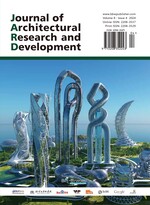Abstract
To enhance our talent cultivation model through “school-enterprise cooperation and industry-teaching fusion”, we aim to improve the “4321” Industry-Education Integration System. This includes actively promoting the use of case banks and project banks in teaching to develop students’ practical engineering skills through hands-on application of professional knowledge. Additionally, landscape design courses emphasize practical learning experiences to implement the fundamental goal of “cultivating morality”. Guided by enhancing students’ practical skills, we ensure alignment with course objectives and professional training requirements, emphasizing the seamless integration of theory and practice.
References
Li S, 2022, Landscape Design of Fading Zone Based on the Concept of Resilient City, thesis, Shijiazhuang Railway University.
Chen H, 2023, Research on Landscape Design of Art District Under Industrial Heritage Reuse, thesis, Xinjiang Art Institute.
Mu K, Wu L, Liu Y, et al., 2024, Research on Ecological Restoration Design of Waterfront Slopes along Four Banks of Two Rivers in Chongqing. Water Resources and Hydropower Express, 1–14.
Lanny, 2018, Research on Ecological Resources Protection and Planning of Tourist Attractions in the Northern Foothills of Qinling Mountain, thesis, Xi’an University of Technology.
Jiang H, Lan N, Mao Y, 2021, Discussion on the Ecological Design Method of Urban Waterfront Landscape–Taking Chongqing Urban Waterfront Landscape Design as an Example. Beauty and Age (city edition), 2021(11): 51–52.
Dai D, 2010, A Preliminary Study of Urban Design Methodology Taking into Account Protection and Development–Taking “Chongqing Hechuan Diaocheng Peninsula Urban Design” as an Example. China Urban Planning Society, Chongqing Municipal People’s Government Planning Innovation: Proceedings of the 2010 China Urban Planning Annual Conference; Chongqing Institute of Planning and Design, 2010:10.
